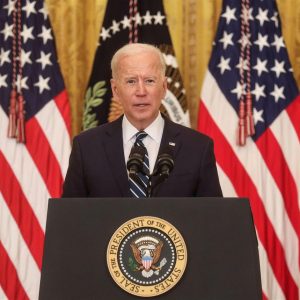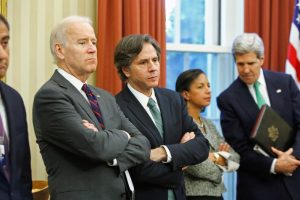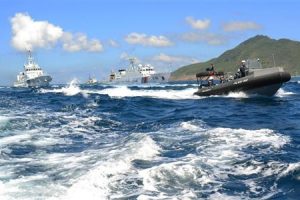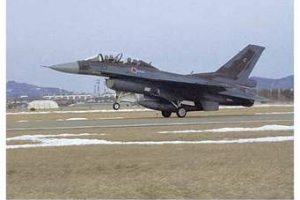"The future of the world depends on Japan." Prior to Prime Minister of Japan Yoshihide Suga's visit to the United States , which was officially scheduled on April 15-18, a former minister of Japan's quasi-allied Australia published a book with this title. "In order to stop China's aggression and realize the loss of power of the Communist Party, Japan definitely needs to have stronger military power," he said. For the past month or so, the movement of the US administration of Biden over Japan has been devoted to the extraordinary "Top emphasis given to Japan." The books of former Australian ministers are the culmination of that. But behind the scenes, the United States is undoubtedly saying, "Strengthen the four-country partnership (quad) with the US, Australia and India at the expense of the economy." " Take part in Freedom of navigation " along China's military artificial islands in the South China Sea. Don't hesitate to take part in military operations against China, including the United Kingdom and France, increase defense costs, and expand the armed forces. "
■ "The greatest geopolitical test"
In early March, the White House compiled the Biden administration's "provisional guidelines for national security strategy." It positions China as "the only competitor to challenge the international order in all aspects of its economy and technology," and declares that "it is the United States that will shape new international norms and agreements." Although the expression as a competitor has been softened, he asserted that it is a tyranny that should confront and overthrow China, which is challenging the hegemony of the United States. It's an unmistakable new Cold War declaration.

[Photo] President Biden held his first press conference on March 25 after taking office and described the issue of China as "a struggle between democracy and tyranny."
Most notably, during the guideline published , Secretary of State Blinken stated that the rise of the Communist Party-led China is "A key challenge facing The United States, as" the biggest geopolitical test "of this century." Why did Japan "become a new cold war front for the United States?" This is a key expression in understanding whether or not it is "most important".
The British Empire, which conquered the world's oceans since the 1 9th century, so far has seen the continent country of Russia as the main enemy as geopolitical viewpoint. The Empire has devised a geopolitical global strategy to siege the Eurasian continent from the periphery and to deter and tighten the movement of hostile force. It was an attempt to theoretically construct political geography (geopolitics), which had developed in earnest in continental Europe such as Germany in the 18th century, from the standpoint of a maritime hegemonic nation.
British geopolitics developed dramatically from the 19th century to the 20th century in unison with the United States. The most prominent maritime strategist and geopolitician is US Navy Admiral Alfred Thayer Mahan. Mahan built a sea power theory that emphasizes command of the sea in the Pacific Ocean, but today China has set the first island chain and second island chain for the U.S. military as the sea power line for Eurasia. The name was changed to the first island chain and the second island chain, which are anti-access / area denial (A2 / AD) lines, and they are being used in reverse.
In the 20th century, Halford Mackinder of the United Kingdom said that "the one who controls the Eurasian continent, which is Heartland, will conquer the world". And Nicholas Spikeman of the United States said, "The United States will form an alliance with the major nations on the continental margin (Rimland), which is the route of invasion to Heartland. It could prevent the country of Heartland from controlling the countries of Rimland."
Geopolitics who have a direct impact on the Biden administration is Zbigniew Kazimierz Brzezinski(1928 – 2017 ), who served as president diplomatic adviser at the time of the Obama administration, which was laid Mr. Biden to Vice President (2009-2017). Following the adviser inauguration of President Johnson, Brzezinski served as Assistant to the President to national security affairs, during the Carter administration ( 1977 - 1981 ). He compared the Heartland Eurasian continent of the chess board, "the United States will be the first to manage Heartland Eurasia as a non-Eurasian nation. "
This is the ambition of the US establishment, which became the only superpower in the 1990s when the Soviet Union collapsed and the threat of the rise of China had not materialized, and Mackinder's "Heartland, the Eurasian Continent." It was also a paraphrase of "what controls conquers the world."
Also, at this time, in 1992, Paul Wolfowitz and other neocons (neoconservatives) took the lead in the US Department of Defense, saying, "In the post-Cold War world, the rise of superpowers that will become American rivals will not be allowed. A defense guideline has been created.
The island nation located at the western end of Eurasia is the United Kingdom, and the Japanese archipelago is at the eastern end, without needing to expand the world map. The US-led North Atlantic Treaty Organization ( NATO ) for the containment of the continental state Russia has expanded to the Russian border due to the eastern expansion due to the collapse of the Soviet Union , and the formation of a Pacific version of NATO aimed at containing China is progressing. Japan, which is adjacent to China, is now at the forefront of a new Cold War for both the United States and Britain, which lead this. It is natural that Japan is given the highest priority from a geopolitical point of view. In other words, Japan must be used to the fullest as a piece of China's containment strategy.
■ Behind the "first face-to-face summit meeting"
2021 3 Political between Japan and the United States from January to April is inevitable become a turning point to further distortion (distorted) the future of relations between the two countries. March 12 is the day of the Japan-US-Australia mark 4 countries received that the first summit meeting of (quad) is opened, 16 Foreign Affairs and Defense in the first face-to-face Brinken US Secretary of State and Austin Defense Secretary in days He came to Japan to hold a ministerial meeting (2 + 2). He bluntly criticized China's "aggressive and authoritarian behavior" and expressed "serious concerns" in a joint statement to China's Maritime Police Law and others.
The White House treats Prime Minister Suga's April visit to the United States more than ever. First of all, it was emphasized that it would be the "first face-to-face summit meeting with President Biden ". Subsequently, the US Senate submitted a resolution emphasizing the "importance of the Japan-US alliance." NHK said on March 27 , "Before Prime Minister Suga's visit to the United States, bipartisan lawmakers submitted a resolution emphasizing the importance of the Japan-US alliance. Senator, Coons Senate lawmakers of the Democratic Party of Biden aides 5 in the people, in the draft resolution, but alliance with Japan and the United States to welcome the Prime Minister of the visit is to confirm the importance of the role that plays in the maintenance of peace and stability in the region , Promoting a free and open Indo-Pacific. "
Meanwhile, US Secretary of State Brinken and Secretary of Defense Austin visited South Korea to open a 2 + 2 following their visit to Japan. However, South Korea refused to criticize China or even mention the word China in its joint statement in consideration of China, saying, "The US-ROK alliance reiterates that it is the core of peace, security and prosperity in the Korean Peninsula and the Indo-Pacific region. The tea was clouded with the notation "I confirmed it." This means that the "disappearance of the US-ROK alliance" that has been said for some time has become a reality. I have also pointed out several times in this blog that, like Japan, the Association of Southeast Asian Nations (ASEAN) members, located at the eastern end of the Eurasian continent, are strongly refusing to be at the forefront of the Cold War against China.
In short, the US conservatives and military-industrial complex have no other choice. It fueled military tensions between Taiwan, Japan (Senkaku Islands) and China to the utmost limit, and led the Japanese people to convince the Japanese people to sharpen their military activities against China and expand their armaments. It is to strengthen and continue the LDP administration. The first hour of the U.S.-China diplomatic ministers' meeting, which was held for two days in Anchorage, Alaska from March 18 and was blamed for unprecedented swearing, is the beginning of this new propaganda. It became.
■A trap
The message from Washington that "Japan is most important" should be seen as a trap. The Biden administration's excessive demands on the Suga administration to seal China will make the deterioration of relations with China decisive. The Japanese economy would not be possible without cooperation with China. Before visiting the United States, Japanese business people and companies were screaming. The purpose of the United States is not just the collapse of the communist Chinese regime. Following the collapse of the bubble economy 30 years ago, it is to destroy the Japanese economy again and put it under the control of US capital led by neoliberalism. With Suga's visit to the United States, the "lost 30 years" could turn into a "dark 30 years."
■ Pressure to "separate China"
March 16. US State Secretary Brinken who visited Japan chose the first meeting partner as Japan Chamber of Commerce and Industry of Akio Mimura President et al., With the Japanese side. In terms of numbers, the majority of them have invited top Nissho, which bundles more than 1.2 million SMEs , because many companies have relied heavily on Chinese business for the last 30 years.
"Washington has driven a wedge into the Japanese business community, which has strong ties to China," a Japanese government official said. Simply put, the aim is to separate (decoupling) China from Japan's supply chain.
 According to Japanese media reports, Secretary Blinken = photo , President Biden's right side = "is a great opportunity for Japan and the United States to work together to hold the person responsible for plagiarizing intellectual property." "We need a systematic approach to restructuring the US and Japanese industries against unfair and illegal practices," he said.
According to Japanese media reports, Secretary Blinken = photo , President Biden's right side = "is a great opportunity for Japan and the United States to work together to hold the person responsible for plagiarizing intellectual property." "We need a systematic approach to restructuring the US and Japanese industries against unfair and illegal practices," he said.
The US term "Japan-US joint cooperation" that suggests " joint development between Japan and the United States " means that the technology developed by Japan will be provided to the United States free of charge. It was typically shown in the joint development of the F2 fighter described below. While Japan's provision of arms technology to the United States was treated as an exception in the revision of the Three Principles on Arms Exports, US technology was put in a black box. The substance of "systematic cooperation between Japan and the United States for industrial restructuring" is visible.
The United States wants to prevent Japan from resurrecting as an economic threat. China also has a common interest in this regard. It must be remembered that the United States and China have the same attitude toward Japan as a victorious country in World War II .
■ Fear of sanctions from both the United States and China
Like many countries in the world, including the United States, China is Japan's top trading partner. In the case of Japan, it has been the number one in a row since 2007 and is now an indispensable trading partner. Under these circumstances, business leaders said, "The Chinese economy is not a breakthrough for Japan." "But if the US and China cross the red line of regulation, the company will go bankrupt." It's up.
Executives of the Ministry of Economy, Trade and Industry "Japanese companies did not only ask them to strive individually to each company so that to ask. China not stolen the technology and information. But 3 Tsuki 16 Japanese government, such as Japan and the United States 2 + 2 days It has kept pace with the US's "control against China". China is strongly opposed to Japan. "
In response to the arrival of the US-China confrontation era, the Liberal Democratic Party established a new International Order Creation Strategy Headquarters and recommended to the government to develop an economic security package promotion law for China. Akira Amari, the chairman of the headquarters, warned that "if the government and companies make a mistake, not only the companies but the whole country may be removed from the supply network of both the United States and China."
The United States is Japan's second largest trading partner after China. Therefore, it is inevitable that a considerable number of Japanese companies, which have to go back and forth between the US-China conflicts, violate either of the regulations of the US and China and are excluded from the transaction. Major companies are no exception. In this way, US investment companies such as the Vulture Fund (corporate acquisition fund) and US multinational capital are aiming for Japanese companies that have advanced technology but are weakening. The nightmare after the burst of the bubble economy 30 years ago could come back. Wall Street has already factored in the further decline of the Japanese economy due to sanctions from both the United States and China.
■ Collapsed "Shelving Agreement"
The Chinese Communist Party 's shift to a reform and open route in 1978 , the Japanese government's enormous Official Development Assistance ( ODA ), and the vigorous investment of Japanese companies in China made the economic ties between Japan and China irreversible. Again, in the 1990s , the Japanese economy could not be maintained without trade with China. Prime Minister Kakuei Tanaka (then), who visited China in September 1972 and normalized relations with China, agreed with Prime Minister Zhou Enlai (the same) to shelve the issue of sovereignty over the Senkaku Islands in order to develop friendship between Japan and China. This maintained a friendly relationship between the two countries, which was decisively destroyed by the Democratic Party of Japan administration in September 2012 .
There was indirect intervention by the United States in the process of breaking the Senkaku Islands sovereignty claim shelving agreement. In the 2000s , China strongly opposed Japan's move to join the permanent members of the UN Security Council by being tempted by the United States, and launched anti-Japanese demonstrations nationwide. The Japanese sense of China also deteriorated at once. And it becomes clear that the past of both Japan and China has not been settled.
2012 May , Shintaro Ishihara of the time Governor of Tokyo (at the time) in a speech made in the symposium in Washington of the Heritage Foundation sponsored, revealed that it has reached a basic agreement in the direction to purchase from landowners officials the Senkaku Islands. This will lead to nationalization by the Democratic Party of Japan six months later. Governor Ishihara announced the purchase plan for the Tokyo Metropolitan Government at a meeting hosted by the most warlike conservative think tank, which was integrated with the Pentagon. The intentions of the US conservative rulers and the US military-industrial complex to use can be seen through.
■ Darkness over the Senkaku
From the Obama administration to the Trump administration to the current administration of Biden, successive US administrations have repeatedly stated that the Senkaku Islands are within the scope of Article 5 of the Japan-US Security Treaty . At the same time, the Japanese media arbitrarily judged that Article 5 of the Security Treaty "stipulates the US defense obligations of Japan", and in the event of a Senkaku emergency, " Article 5 of the Security Treaty that stipulates the US defense obligations" It applies. "
Indeed, Article 5 states, "Each Contracting Party acknowledges that an armed assault on one of the territories under Japan's administration would jeopardize its own peace and security. Declare to act in accordance with constitutional provisions and procedures to address common risks. " However, it is not specified as "defending Japan." It is ambiguously written as "acting to deal with common dangers." For some time, it has been whispered that the United States has no intention of seriously confronting China's armed assault over a small uninhabited island in the East China Sea.
 [Photo] The waters around the Senkaku, where tensions are rising due to the enforcement of the China Coast Guard Law, which enables the use of weapons.
[Photo] The waters around the Senkaku, where tensions are rising due to the enforcement of the China Coast Guard Law, which enables the use of weapons.
The true intentions of both the United States and China, which are nuclear superpowers, should be completely exempt from armed conflicts such as the sovereignty of the Senkaku Islands. Then who would benefit from the heightened military tensions in the waters around the Senkaku?
Beijing (Xi Jinping leadership) to take to, thereby uplifting the anti-Japanese nationalism shows the intention of the unyielding and to recapture the Senkaku Islands to the Japanese Empire was seized under cover to Dosakusa of the Sino-Japanese War (Diaoyu Islands) is regime stability decisively It's valid.
On the other hand, Washington urges the Japanese government to become more involved in the Chinese siege network by threatening the Japanese people and raising anxiety as if the impossible scenario of a full-scale military conflict between Japan and China triggered by the Senkaku emergency was approaching. Let me. Above all, the latest US-made weapons can be sold in large quantities to Japan.
The crisis over the Senkaku, where the Japanese are misled, is covered in darkness.
■ Government levitation and general election glares
Even the Abe administration, which repeatedly said, "I am 100% with the United States," did not participate in the "Freedom of Navigation" operation in the South China Sea. Retaining the ability to attack enemy bases using North Korea's nuclear and missile development as an excuse paved the way for the Self-Defense Forces to purchase state-of-the-art US-made missiles, and the U.S. military saw an opportunity to turn the Japanese archipelago into a missile base for China and Russia. While the ad balloon, which is a threat to China, has been inflated, what is waiting for Suga and his group to visit the United States is "Japan called YES," including participation in the "Freedom of Navigation" operation.
The United States whether the obedient person how the United States is a man named Yoshihide Suga is at the time of Chief Cabinet Secretary 2019 year 5 is a check has been invited to Washington Kan in May. Here is one example of the story that most symbolizes Suga's attitude toward the United States.
 [Photo] F2, the successor fighter of the Self-Defense Forces, which was developed under the initiative of the United States under the name of joint development between Japan and the United States.
[Photo] F2, the successor fighter of the Self-Defense Forces, which was developed under the initiative of the United States under the name of joint development between Japan and the United States.
In 2016, the Ministry of Defense was particular about the successor to the F2 fighter. The F2 is the successor to the first domestic jet fighter, the F1, which was retired in 2006. Since F2 was jointly developed with the United States, the Ministry of Defense and Japanese munitions companies urged "Japan-led". However, the US government has strongly urged that "development only in Japan is difficult. The US can provide what Japan wants," and the US aviation industry is selling fiercely.
Pressure from the United States also broke the Japanese government. According to government officials, Prime Minister Shinzo Abe (at that time) understood the significance of domestic development of the F2 successor, but Secretary of State Suga (same) simply compromised that he should buy the one from the United States.
"Mr. Suga wanted to avoid putting extra pressure on the prime minister from US President Trump," a government official said. There is no doubt that Suga calculated, "Mr. Trump expects to buy a large amount of US-made defense equipment. If he buys a successor from the US, he will not have a new fire in US-Japan relations."
It is clearer than watching the fire that Prime Minister Suga will devote himself to a performance that "does not create a fire in US-Japan relations" in mid-April Washington.
Last April 2nd .In each media, Chief Cabinet Secretary Katsunobu Kato announced the schedule of Prime Minister Suga's visit to the United States, saying, "This is a face-to-face summit meeting ahead of the leaders.
If this visibly boosts support for the Suga administration and the Liberal Democratic Party, Washington will see through Japan's civilization and Japan's future will only go into darkness.
